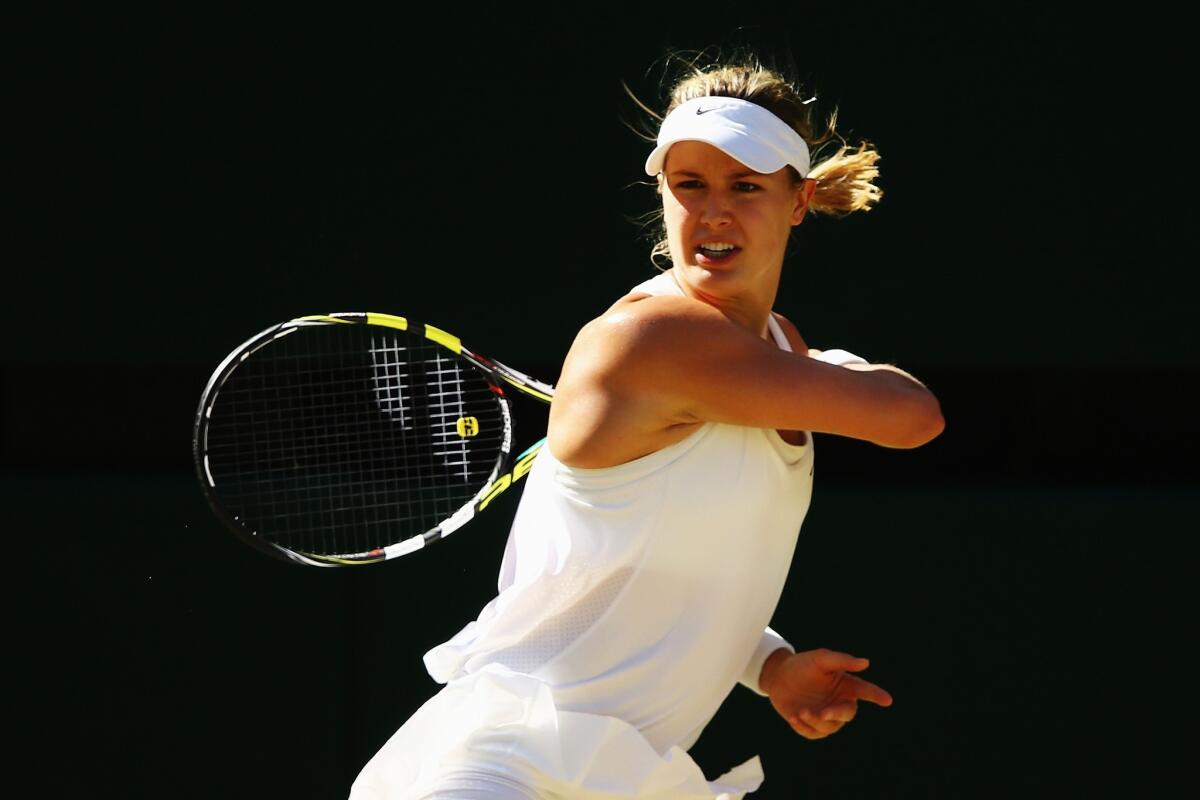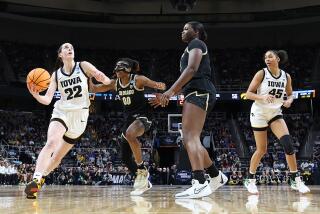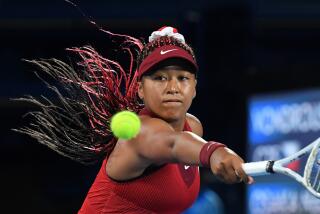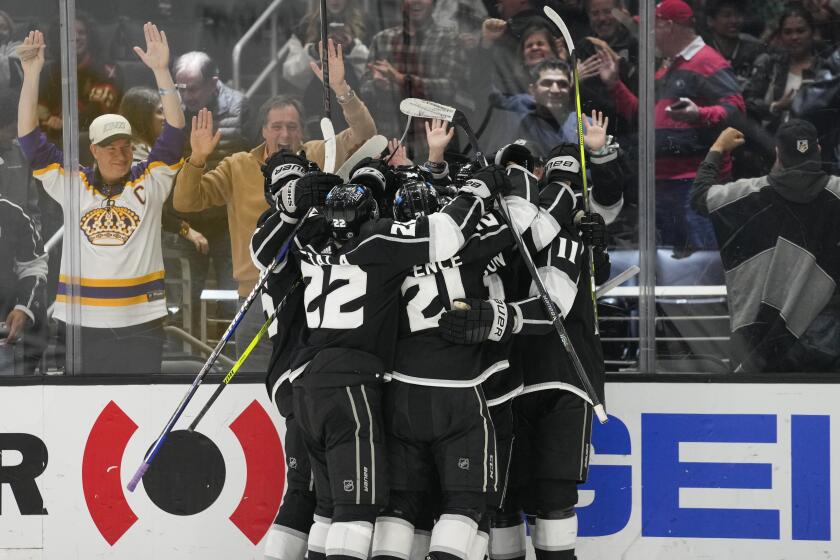Eugenie Bouchard, headed to Wimbledon final, is poised for greatness

It is still a little too soon to canonize young Eugenie Bouchard as the next big thing in women’s tennis. We will wait until Saturday.
That’s when the current pride of Canadian sports, now that the Kings have taken hockey away from them, will play in the women’s singles final at Wimbledon.
Bouchard is 20 years old, going on 40. She is poised beyond her age, and just as talented.
She is tall, blond and well-spoken, with a smile that lights up a room. She comes from a family of privilege in Montreal; has siblings that, like her, are named for royalty — her twin sister is Beatrice — and lives on the same street as former Canadian Prime Minister Brian Mulroney.
In her post-match news conference, she was asked about the general impression that she had a chance to become a combination of the next Maria Sharapova and Anna Kournikova. The questioner certainly wasn’t talking only about athleticism. The tabloids were poised, goose-bumpy.
“I just want to be the next me,” she said, as if she had a public relations coach who had anticipated that question.
Oh, yes. She can also play tennis. The in-person wows are more than equaled by the on-court wows.
She came to Wimbledon seeded 13th, much of that based on surprising advances to the Australian and French Open semifinals. Her world ranking progression is as follows: In 2008, she was No. 1,104; 2009 No. 1,068; 2010 No. 538; 2011 No. 302; 2012 No. 144; 2013 No. 32.
Now, after her 7-6 (5), 6-2 victory over Romania’s Simona Halep on Thursday, she is No. 8. That’s equal to the best female Canadian ranking ever — by that country’s longtime tennis darling, Carling Bassett.
Bassett never made it to a Grand Slam final. Neither has any other Canadian.
“More Canadian history,” Bouchard said, in a tone so nearly dismissive that there is no mistaking that she expects more. Like, perhaps, a Wimbledon title.
When asked about celebration plans for her semifinal victory, she said she had none because, “My work is not done here yet.”
Standing in the way of “O Canada” being played at Centre Court on Saturday is a veteran left-hander from the Czech Republic, who won her semifinal match by beating a veteran left-hander from the Czech Republic.
It was Ova over Ova. Petra Kvitova beat Lucie Safarova in a match similar to Bouchard and Halep. Kvitova overcame some startup nervousness and went on to win, 7-6 (6), 6-1.
For years, they have played at the same tennis club and been teammates on the Czech Republic Fed Cup team. But the differences are obvious on the court. Safarova, 27, was in her first Grand Slam semifinal. Kvitova, 24, won the Wimbledon title in 2011. They have played six times and Kvitova has won six times.
Still, the familiarity and friendship thing bothered Kvitova, the highest-seeded survivor at No. 6. “I had to try and tell myself it was just another player across the net,” she said.
Suffice to say, Bouchard will not be just another player, and Kvitova knows it.
Bouchard, who covers the court in a way that brought a special mention from her vanquished opponent, hit 20 winners in the 1-hour 34-minute match and won 81 of the 147 points.
“Her position on the court makes you see her more,” Halep said. “Her style is to stay very close to the baseline.”
Bouchard’s style is also to stay poised. Three times during the match, there were disruptions that often affect a player as young as she.
On the last point of the fourth game of the first set, Halep, who scurries around the court like a female Lleyton Hewitt, turned her ankle. She needed about 10 minutes to get it taped.
This kind of medical scene is oft-repeated in women’s tennis. There are lots of stoppages of action, prompting cynics to ask the WTA to keep a new stat: potty breaks.
The first thought was that Halep, limping badly, was facing the tough choice of quit or grit. To her credit, she didn’t quit, even though she clearly couldn’t go hard to her left the rest of the match.
Then, in the middle of the first-set tiebreaker, both players looked up to see the chair umpire scurrying across the court toward the spectator seats. A woman had fainted, the umpire apparently had seen it, and he was making sure that it would be — as it should be — tended to first.
Then, as Halep tried to hang tough at the end of the second set, Bouchard protested to the chair umpire that she had heard a noise in the crowd and had raised her hand to stop play, meaning that Halep’s ace shouldn’t have counted.
The umpire didn’t agree, and losing that conversation was especially difficult for Bouchard, because it had been her first match point. Five match points later, she hit an unreturnable 99 mph serve and was in the Wimbledon final.
Questioned about each of these disruptions, Bouchard answered basically the same way. “I take it as a challenge,” she said.
Kvitova will be the betting favorite, especially after John McEnroe picked Bouchard on TV. But there is no question, Bouchard has cornered the market on buzz here.
Kvitova will rely on the experience of being a crafty old 24. Also, the perspective that comes with that.
“It’s Wimbledon,” she said. “It’s the best tournament in the world. This is what makes tennis special.”
More to Read
Get our high school sports newsletter
Prep Rally is devoted to the SoCal high school sports experience, bringing you scores, stories and a behind-the-scenes look at what makes prep sports so popular.
You may occasionally receive promotional content from the Los Angeles Times.







